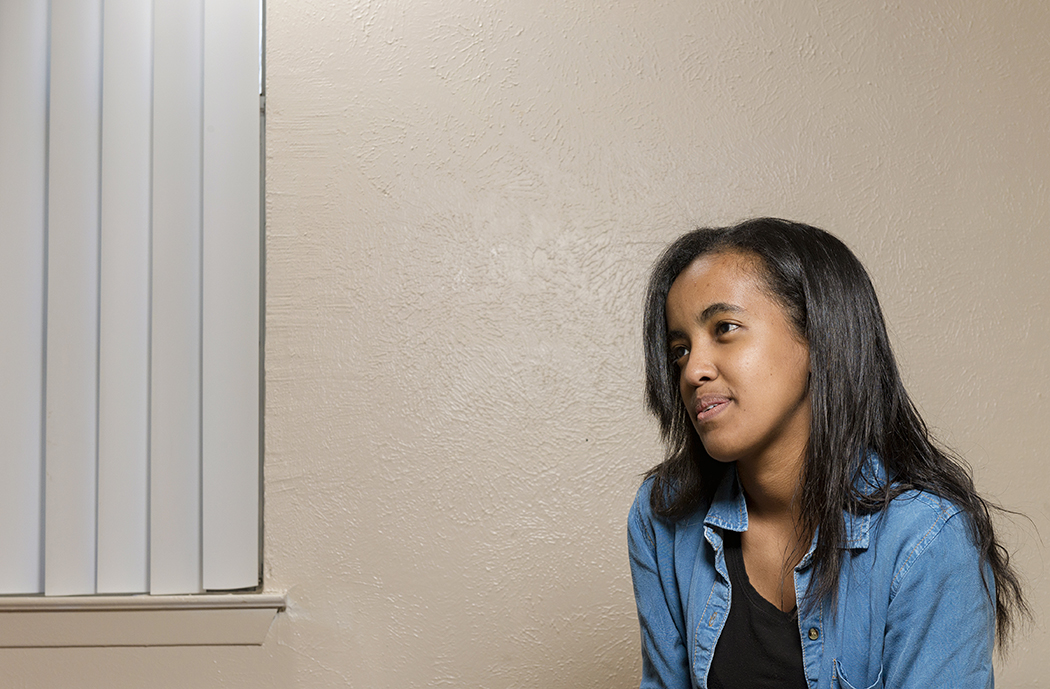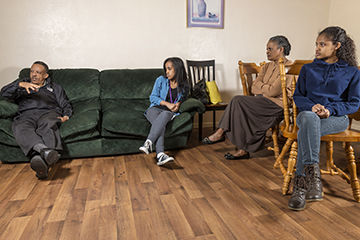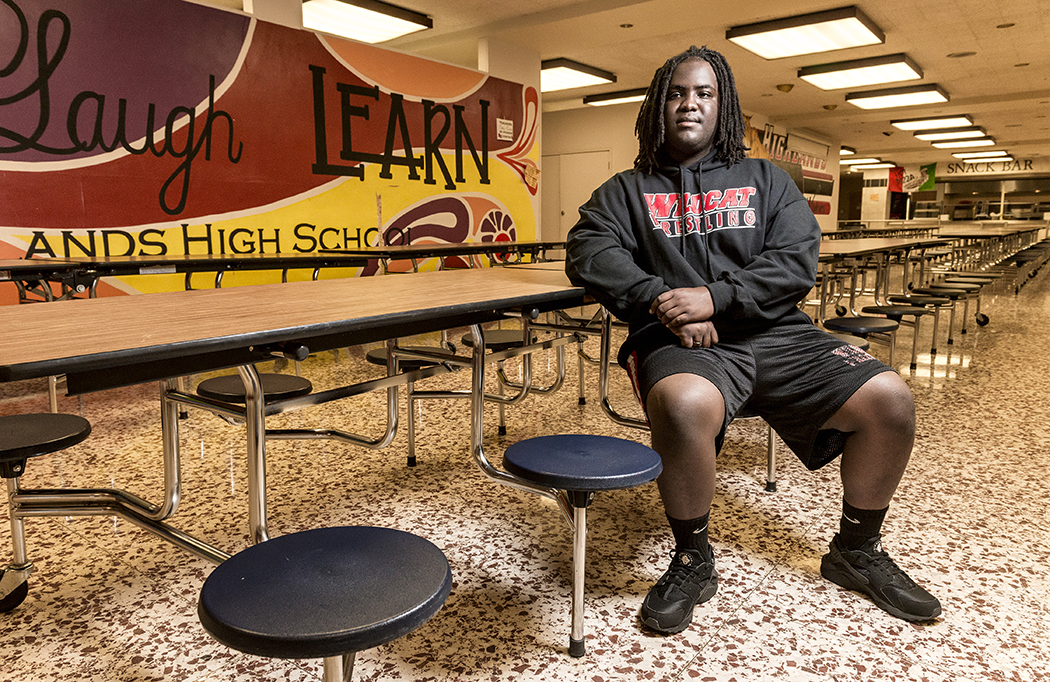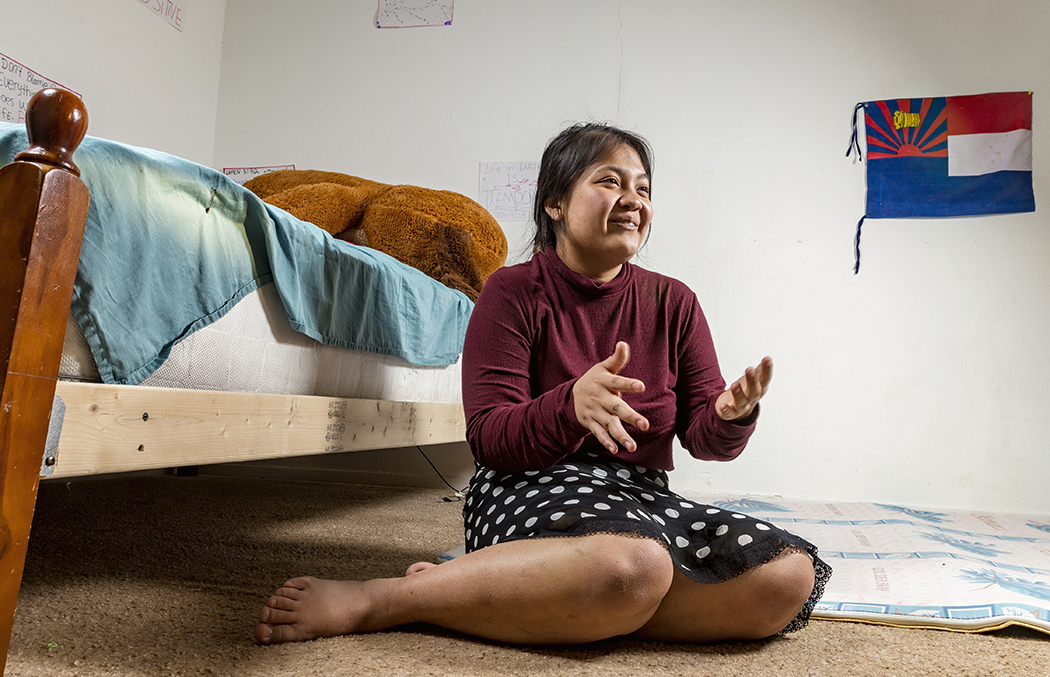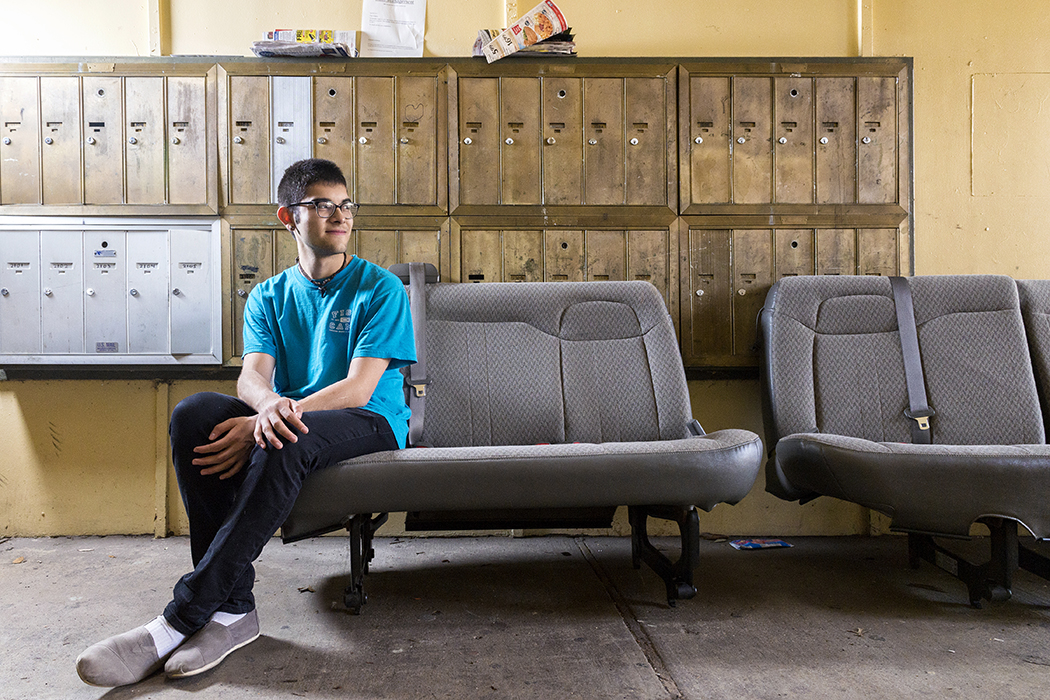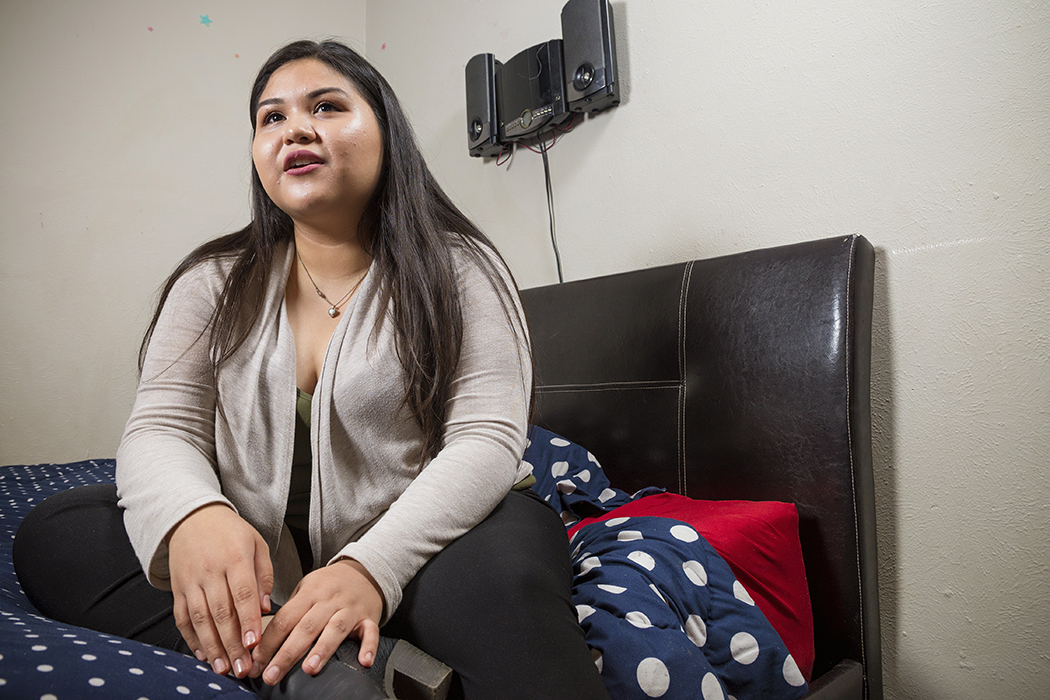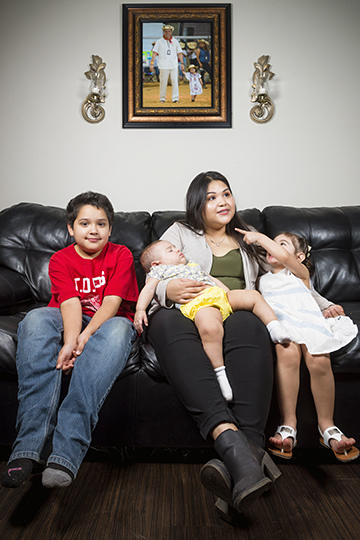The deck was stacked against them, but these graduating seniors stayed in the game
![]() No one said high school was easy. The diploma, for every student, is hard-won. But some Lake Highlands High School graduates have navigated roads that would stop seasoned adults in their tracks. Forced to find their way in a world that often did not accept or understand them, they pressed on — after each stumble, rising again. Despite a dark past and challenging present, they stand an excellent chance of future success on a large scale.
No one said high school was easy. The diploma, for every student, is hard-won. But some Lake Highlands High School graduates have navigated roads that would stop seasoned adults in their tracks. Forced to find their way in a world that often did not accept or understand them, they pressed on — after each stumble, rising again. Despite a dark past and challenging present, they stand an excellent chance of future success on a large scale.
 Brilliant Blen
Brilliant Blen
On Oct. 28, 2005, Blen Hussain woke up early to commotion; men’s stern voices filled her home. Her father, Kiflu Hussain, told his wife and children, “Don’t worry. I’ll be back in a few hours,” and he left with the men.
He spent the next year locked away in the infamous Kaliti Prison.
A lawyer, activist and journalist, Kiflu published an editorial alleging corruption in a recent election and regime. To say this prison was overcrowded would be a gross understatement, notes Kiflu. He says he’s seen photos in The Economist magazine of so-called “overcrowded” American prisons, remarking that one cannot find a middle-class hotel in Ethiopia so comfortable. And the Kaliti prison indiscriminately mixed violent assailants, murderers, pedophiles, the mentally ill, political prisoners and juveniles.
“It was a concentration camp,” Kiflu says, “minus the gas, only because they had not figured out the technology.”
There was a point he feared for his life, “but it was my family I worried about.”
Blen’s mother, Tizita Bogale, lost her beloved brother, a college student, in Ethiopia’s violent Red Terror in the late 1970s. Brokenhearted, she rejected activism in favor of religion, but in the mid-1990s she fell for an outspoken revolutionary. When her dear husband Kiflu was imprisoned indefinitely, she was left with their young daughters to make ends meet. She wasn’t the only one, Blen recalls. Many men, who in her country tended to be financial breadwinners, were locked up or had fled, so there really was no way for families to help each other — everyone was scrimping.
The first time the girls and Tizita visited their father in prison, he stood among a throng of filthy fellow inmates. Blen’s sister, Sophie, 4, looked at the line of prisoners and, guessing a brawl was to blame for her father’s incarceration, asked, “With whom did you fight?”
Her dad, making sure no one was listening, leaned toward her and whispered, “Meles Zenawi” (the Ethiopian dictator).
“I’ll never forget the day I got out, it was drizzling, we were walking, and Sophie asks, ‘Are you now friends with Meles Zenawi?’ ”
He’d forgotten his quip, but the girls had not.
Shortly after his release, Kiflu wanted to write about the conditions of the prison (he eventually did for ethiomedia.com), but he was tipped off that the authorities were returning for him. So he fled.
Police came to the home looking for her dad, Blen recalls. Obtaining a warrant, they ransacked the house. Kiflu applied as a political refugee to bring his family to safety. They met him in Uganda and awaited acceptance to Canada or Australia. There, seven years passed.
Blen eventually gave up, unpinning maps of those faraway countries, which hung wistfully on her bedroom wall. Life in Uganda wasn’t so bad, she says. Dad held out hope, though. He’d become acquainted with American professors who were conducting research in Uganda — they hired him as a translator and offered him a job in Dallas. Two years and umpteen interviews, tests and questionnaires later, the family gained acceptance into the U.S. refugee program.
Ever practical, Blen worried about school and rent in America and, even more, that the whole thing was a trick.
The plane ride to Dallas, by way of Brussels and New York City, was “the highest form of excitement in my life, to this day.”
It was happening.
Blen, at 17, could not believe her eyes when she arrived at Lake Highlands High School. It was so big, like a city compared to her previous school. A student guide/mentor made her first day bearable by showing her around. Until teacher Matthew Morris and his AVID class, she knew nothing of GPAs, SATs or college scholarships.
Today she claims a 3.8 GPA. She is involved in a peer leadership/anti-bullying group, and she won the Character Counts Award from the Lake Highlands Exchange Club. French club, Police Athletic League, the Mayor’s Dallas Youth Council and a Young Women in Science and Engineering at University of Texas at Dallas — it’s but a partial list of activities in which Blen takes part.
She is excessively embedded in such pursuits because she wants to broaden her mind and scope of opportunity.
Living a life far better than what her parents experienced in their youths, Blen nonetheless sees imperfection in America and Lake Highlands. She witnesses segregation, mostly self-imposed, at school and around town. She knows things could improve for incoming refugee students who often go along indefinitely without knowing the fundamentals of how education works in America.
Some weekends, she’ll toss on a backpack, hop on a DART train and explore Downtown for hours.
Her dad used to go on long walks when he was home in Ethiopia, which at the time she thought was “weird,” but now she gets it. She already earned a scholarship to Texas Weslyan, a law-focused university in Fort Worth where she might study immigration law.
She appreciates art — something at which her little sister is gifted, she says — and music, literature and writing. And a good debate.
Her father, and his father before him, gave their children the gift of free information.
Kiflu’s father, a pilot, made a point to bring BBC and Voice of America into the home, so his children would hear English and become globally informed.
Kiflu has done the same for his family.
And while he has much to do before he could, say, return to law school or write a book about his experiences, he must work to pay the bills. At times that has meant delivering pizzas. But last month he took a job with Dallas courts interpreting the Amharic language to English. He will work civil, criminal, immigration cases — anywhere he is needed. He hopes to open an interpretation/translation services office near their Lake Highlands apartment soon. Blen’s mother works deep nights in food service at an East Dallas hospital.
Like every member of her family, including, 10th grader Sophie, Blen smiles frequently and exudes charm and wit. Talking about his girls’ futures, the proud father says he has no worries.
“Blen will be maybe a lawyer, maybe Matlock [which Kiflu was watching when we arrived — it’s his favorite show] or a politician and diplomat like Madeleine Albright.”
The family enjoys a communal chuckle, mostly at the Matlock mention, and not because they doubt Blen could be any of the three, in her own right.
 Strong John
Strong John
Stories that start out like John Allen’s don’t generally end well. He came from a big family who loved him, but he lacked stability and shouldered more responsibility by age 14 than many adults can handle. He has been thrust into crime-ridden environments, lost multiple family members to gun violence and illness, and been reported as “suspicious” when he was merely mowing lawns to help support his family. John is mostly stoic as he unravels his past. Born in South Dallas, he moved around, changing schools on a regular basis. And with every stint as the new kid came a dose of bullying.
Most of the time he lived in apartments, often in problem neighborhoods, where he and his brother would wait until the last possible minute to arrive at the bus stop in order to avoid harassment. At one point he, his mom and brother moved into a three-bedroom home on a nice East Dallas street. That is, “with about 13 other people,” he says. He is not exaggerating, he assures. There were siblings, aunts, uncles, kids, his mom and grandma.
Lake Highlands was the first place he could call home, he says, though things weren’t perfect here.
In junior high, he discovered football. He loved being part of the team. “I think I played a lot because I had good grades, not because I was the best football player,” he says with a hint of a smile.
But two of John’s family members died in quick succession. His aunt, who also was his mother’s best friend, died giving birth, leaving several children behind. Not long after that, his mom’s brother was shot in the head. That uncle lived some eight months, during which time he and John became close. They talked, bonded and attended church together; the elder was determined to change the lifestyle that led to the shooting. But doctors never could dislodge the bullet from his brain. John was 13 when his uncle died. His mother spiraled into depression over the losses.
John, too, was mourning. But he had little time to grieve. He filled the gaps, taking care of everything from grocery shopping to getting his siblings to school and doing laundry.
By all accounts, John was making heroic efforts for someone his age. In addition to the responsibilities at home, he made near-perfect grades and worked.
He says he regularly faced prejudice anyway.
One time, he recalls, he was wearing a coat that belonged to his estranged father.
“I missed him so much that I would wear his jacket and I guess it made me look a little older than I was.”
He thinks that is part of the reason a pair of bicycle police officers followed him down a residential street as he walked home from school, hollering. “Hey you, where are you going? What’s in that backpack?” They stopped him and patted him down, physically pushed him into a sitting position on the curb, searched his school bag and demanded identification. He produced his Lake Highlands Junior High student ID card.
Then there was the time, more recently, when he was working a landscaping gig — a task he completed on a hot summer evening, after two-a-day football practice, no less — and he had to carry his equipment home himself. It took two trips between the mower and edger and other gear. Embarking on his second trip, a police car hopped the curb, pulling in front of him on the sidewalk. An officer stepped out and began interrogating him. Once he told his story, the officer “was calm” and let him know that a “concerned homeowner” had called him in — “a suspicious person, disturbing the peace, something like that,” John says.
At a job from which he has since resigned, a manager accused John of stealing from the register. “I kind of waited for an apology after he found the ‘missing’ $80, but none came,” John says. When these things happen, John tends to go high rather than outwardly react.
At LHHS, John joined the wrestling team, a move that “really changed things,” he says. It would become a place to work out pent-up frustration, too.
He still played football, cashiered (at Albertson’s until it shuttered), mowed and volunteered on weekends, as required by one of his classes. He helped pay the bills at home and care for his siblings. He even rekindled some semblance of a relationship with his father.
But John lost another uncle, this time to cancer. And during the winter of sophomore year, his dad disappeared. After a period of mystery, John learned by happenstance that his father had been shot and did not tell anyone. John only found out because his grandmother’s friend was a nurse where John’s dad was a patient.
LHHS wrestling coaches such as Pete Grieder, who retired in 2016 after 32 years, pulled John from his rut with simple empathy and encouragement, John says.
The first important thing to John about wrestling is that he believes he is good. “I’ve played football and done other things; this was the first thing I ever felt I was good at,” he says.
Coach Kevin Wainscott calls John a “sort of gentle giant — so quiet on the sidelines, but in a match, this toughness comes out.”
The day John learned about his dad’s shooting, he wrestled in a tournament. As is typical, he did not talk about his troubles. Atypically, he lost his first match.
“Coach Grieder right away tells me he knows something is wrong,” John says.
“He said, ‘Just pick yourself up, John, and get through today.’ “
It was enough to motivate John, who decided to stop making excuses, he says, or feeling sorry for himself. He’s heard other voices out on the mat too, such as that of his deceased uncle, who, clear as day, said, “Keep fighting and push through.”
 Moo’s motivated
Moo’s motivated
A wise elderly grandmother’s soul seemingly is trapped inside Moo Hser’s teenage body. Maybe it is the way that she walks a departing visitor to her car, hugs her, then stands, smiling, waving, otherwise unmoving, fading as her guest exits the lot of the apartment complex, where Moo lives among a population of mostly refugees from the Myanmar region. Perhaps it is her attitude; she perpetually smiles, jokes, doles out specific compliments to everyone she sees and repeats, “It’s OK” after describing a terrible personal experience.
As soon as she introduces herself, Moo hands over three sheets of type-filled paper. “It’s my story, because my accent is bad and you might not understand me,” she says.
Growing up in a refugee camp in Thailand made Moo lose faith in the world, she writes. “Me and my family were starving, crying out for hope, freedom, food. Every night I heard my mother cry, crying herself to sleep, and I witnessed her trying to commit suicide.”
The first time, Moo saw her mother attempt to hang herself with a sheet, she says. Another time, she ingested rat poison. When Moo was 8, sharing her mother’s despondency, she swallowed a handful of all the pills and medicines she could get her hand on.
Moo’s parents had been through so much — Moo remembers the carnage of 2001, she writes, though she was just 3. “Blood everywhere. People young and old hit the ground. Babies die in parents’ arms from bullets and bombs. My mom carried my baby brother and my dad carried me in his left arm, with my older brother in his right while our oldest brother ran like a cheetah. I remember my parents’ faces, worried about us, not themselves. I remember I looked back and saw women being tied up and men being shot right in front of their families.”
Moo’s family would live to see better days, but not for nearly a decade. Though they escaped the bloodbath in the forests along the Burma-Thailand border, they continued to fight for survival throughout nine years in the massive Mae La camp, sustaining on bamboo, flowers and bugs they found in nearby mountains. Shelter was constructed from wood, bamboo and leaves, making the risk of fires extreme. The Karen Women’s Organization revealed numerous cases of violence against women at the camp in 2011-13 (after Moo and her family moved, though earlier reports had prompted the research) and showed that victims found little justice. Living among some 40,000 other refugees, all of them hoping for resettlement, possibilities looked bleak. So when Moo’s family immigrated to America in 2007, she says, it was as if she had relocated to paradise. “I saw these lights of the city. I saw this streetlight. Glowing poles and markers along the roads. It was so shiny, so beautiful. I knew everything I dreamed was true — it was Heaven.”
Her elation was short-lived. The bullying began when she arrived at Hotchkiss Elementary School.
“I was lost,” she says. “I did not know where to go. I did not know how to speak English. I was picked on from the first day. They made fun of my name. Moo means ‘life’ in my country, but that’s not what it means here. And worst of all no one was there to help me get through it all.” She recalls a boy with a bloody injury telling a teacher that she had hit him. Horrified at both the blood and the subsequent false accusation, she had no words to defend herself. Today Moo understands, “The people making fun of you, the meanest ones, are the ones going through the most hard times.” Pain, caused by weapons or words, can be temporary, Moo says. “God has a dream for us. That is what is real and permanent.”
Friend Blen Hussain says Moo “defies my understanding.” Despite everything, she is always laughing, smiling and hugging everyone, even strangers. “She will hug you,” Blen advises. (True.)
As a child swallowing pills, believing death the only way out, Moo could never have imagined attending a large urban high school, graduating and attending college. But, thanks to teachers including Matthew Morris and Alissa Long she is destined for university life. “My teachers here, in AVID and every one of them, have changed my world in a good way.”
Moo will double major in theology and business, she says. She declines (with a big, mischievous smile) to say on record what she aims to do with the degrees.
“I know, but I want to keep it a secret.”
 Determined Derek
Determined Derek
Derek Gonzalez wears side-swept bangs that dip below dark brows and obscure one eye; black-rimmed glasses cover his cheeks and magnify thick lashes. He speaks softly, but Derek says he is finally sure of himself and wants to share his story, even if it means upsetting certain family members, all of whom he loves beyond measure. “I am an open book. I don’t have anymore secrets,” he says.
Brushing hair from his forehead, he matter-of-factly discusses painful topics. Two events unleashed the darkest days of his young life; the effects led to self-harm, attempted suicide and three separate psychiatric hospitalizations before high school.
When he was 9, an adult sexually assaulted him. He was too terrified at the time to tell anyone what happened (he later shared the details with both psychiatric professional and his parents).
The second trauma happened in eighth grade, when Derek told his parents (who live separately) that he is gay.
“They were not OK with it,” he says. “Neither of them.”
Derek is close with his multiple siblings. All of them loved him unconditionally, he says, and don’t care if he likes boys or girls.
But Derek was desperate for his parents’ approval, something he cannot acquire “to this day,” he adds.
Despondency led to cutting his wrists and hospitalization to treat depression and suicidal ideations. He returned home with some self-awareness, but when he scratched and picked at his wounds causing them to bleed, his mom got so upset that she kicked him out. He returned to treatment. His mother would not allow him back home upon his release, so he stayed with his dad. Soon another depression sent him to his last stint at “rehab.” This time, he came out stronger. He ended friendships and behaviors that felt unhealthy. He wanted to get better, even if it meant going at it alone for a while. He started studying harder, reading more, retreating into his schoolwork, registering for Advance Placement classes and the college preparation program, AVID.
But home life presented further challenges. Living with his mom during junior year, Derek watched his mother and sister fight, sometimes physically, until his sister moved out. At his sister’s request, Derek went with her, in hindsight a misstep. She got into rebellious stage and brought aggressive boyfriends around. Derek says he hung out with her at parties — late into the night, sometimes drinking — just to watch out for her. He missed so many days of school that he had to take make-up classes.
He managed to catch himself before he fell too far. By senior year he had worked his way back into good standing at school. He has improved the relationship with his parents.
“He let me borrow his truck for prom,” Derek says of his dad, adding that he attended the dance with a group of friends.
Derek moved back into his mom’s apartment, where he pays rent. It’s an old building with chipping paint. A strip of rusty mailboxes line one wall of an open-air hallway. Seats, ostensibly removed from a van, are positioned in a row beneath them. Derek, his hair clipped short now, plops into one, giggling at the incongruity. Small children run up and down the corridor, shrieking happily.
The one-room unit — where Derek lives with his 19- and 7-year-old brothers, his 9- and 21-year-old sister and his mom, Elvira — effectively shuts out courtyard commotion. It’s tidy, showcasing small plaques emblazoned with religious words (“Blessed”) over doorframes. A metallic three-photo frame, the word FAMILY across the top, hangs above Derek’s bed. It displays black-and-white photos of a blissful, mostly blonde family on the beach — they’re stock images, one partially covered by a price tag someone halfheartedly attempted to remove.
Derek laughs about it, but it’s not clear if the frame is a joke, a metaphor or simply an incomplete effort.
Derek’s double bed, along with a long couch, occupies the main living room. The youngsters sleep in a studio area beside Elvira’s master bedroom. Kimberly, 9, is the only family member to hang around. Elvira is shy, Derek explains, and is awaiting the camera’s departure. Kimberly’s not. She interrogates the reporter who is questioning her brother: “How old are you?” “Do you have a dog?” “Do you like Donald Trump?”
She is giddy to have Derek home for a minute. Despite putting in some 30 hours a week at Grimaldi’s, he is excelling in school and deciding on a college. He has been accepted to Midwestern State University but isn’t sure he wants to be that far from his family. University of North Texas or a semester or two at Richland also are under consideration, he says.
He’s weighing either nursing or engineering as a future career, because he loves helping people and excels in math and science.
Derek has avoided romantic relationships, he says, choosing to focus on school and his family. His mom still encourages him to get a girlfriend, he says, shaking his head. He loves her and they share a very special bond, he says, but she is “one of a kind.”
 Monica’s moxie
Monica’s moxie
Monica was born in Nueva Rosita, Mexico to a 16 year old. A few years later her young mother decided to move to America, where Monica’s biological father lived. At 6, Monica moved with her mom into her father’s home in a small East Texas town.
“He turned out to be a terrible, cruel monster,” Monica says. “He was an alcoholic and abusive. I often describe living with him as living in a minefield, where you had to watch and be careful of what you said and did. I personally think he was sick. He would go on a rampage and leave my mother and I bruised all over and the next day apologize, as if it had all been an accident.”
Though there are provisions in place for undocumented women to report domestic violence without fear of deportation, the process was too complex, time-consuming and fearsome, Monica says.
“My mom had to work all the time in order to get away. She was so tired, and she never went through with [reporting the abuse].”
Instead they escaped to the Richardson area, learning along the way that life was “unforgiving for undocumented immigrants,” Monica says. They lived on very little and, to make matters worse, Monica’s father found them and continued to threaten their safety, Monica says, going as far as to gain partial custody of her. The constant fear, continued during the weekends she stayed with him.
“I’ll just say that now he is incarcerated,” Monica says. “And when he is done, he will be deported.”
A senior at Lake Highlands High School today, Monica is ready to graduate in the top 10 percent of her class with a 4.0 GPA — all her classes are AP or dual-credit college courses. She is a peer helper and a peer tutor, meaning she mentors other students both socially and academically. She works two jobs — one waiting tables and the other at a furniture store — putting in a collective 20-22 hours on weekends. Monica lives in an apartment on Whitehurst with her mom, who cleans offices for a living; stepdad, a chef; and three siblings for whom she cares when the adults are working — that is, every night and late.
The children’s ages are 10, 2 and 7 months. That leaves Monica with full hands and little time for studies until everyone is asleep or a parent comes home. “Yes, my youngest sibling is 18 years younger than me,” Monica quips. “I hopefully won’t be a mom for a very long time. Though I do get asked a lot if my siblings are my children. I must admit they do feel like my children.”
Her friend Blen Hussain says Monica was one of her first friends. “I don’t know how she does it, sometimes on two hours of sleep, walks to school, handles so much at home. I know she’s sad or tired sometimes, but rarely shows it, and she is intelligent without effort.”
Monica, like many students who came to the United States as children without documents, has endured times of darkness and doubt. She says enrolling in AVID has helped her stay strong when she feels vulnerable.
“Mr. [Matthew] Morris [AVID instructor] saw potential in me when I was in a very dark place,” she says. “He helped mold me into the student I am today. He has also leant an ear when I needed it, advice when I didn’t want it and, most importantly, unwavering support,” she says.
Monica secured relief from threat of deportation by applying for the Deferred Action for Childhood Arrivals (DACA) program, which the Obama administration put in place by executive action in 2012. It allows childhood arrivals to study and work in this country on two-year renewable terms. However the program does not allow students hoping to go to college to apply for certain student loans.
So far, Monica has gained acceptance to University of North Texas and University of San Antonio, and she has applied for close to a dozen scholarships.
The new administration could discontinue or phase out DACA at any time. During his presidential campaign, Donald Trump called DACA “illegal” and a violation of the constitution. It doesn’t feel good, Monica says, but she is not going to let dread, or anything else, stop her. She aims to study political science and attend law school.
“I might have to work harder. It might take longer.”
On Monica’s wall is a card from a memorial service for a sophomore friend. She killed herself, Monica explains, pointing to the girl’s photo. It was the worst day of high school, she says. “She was overwhelmed and took her own life. Since then I try to be kind to people whenever I can.”
Monica’s mom and stepdad are proud of their daughter, they both say. Her little brother is clearly enamored with her.
She looks down at the 10 year old and says, “I need to be strong, hard-working role model, for him.”

